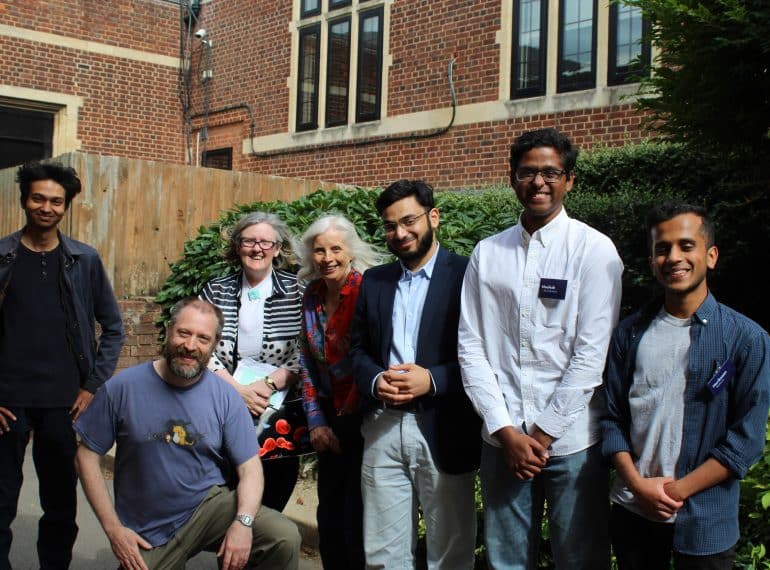
Old Elizabethans helped 50 boys battle it out in a Galactic Challenge at the School that saw all three teams secure multi-billion pound contracts for an imagined settlement in space.
The pupils from Years 7–9 (and from across tutor groups) formed aerospace ‘companies’ to participate in the space industry simulation challenge, competing against not only each other but also the clock. Their target was to design a space station for 100 years hence, when space travel might be commonplace. The remit was for a tourist resort that would orbit Mars.
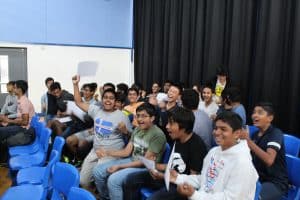 Lending their expertise and experience on the day were four 2017 leavers: Aadil Kara, Neelesh Ravichandran and Harikesan Baskaran and Suchira Peiris. Aadil, Neelesh and Harikesan all got through to the national stages of the UK Space Design Competition (Galactic Challenge’s ‘big brother’ for older pupils) when they were in Year 13, with Aadil going on to reach international level.
Lending their expertise and experience on the day were four 2017 leavers: Aadil Kara, Neelesh Ravichandran and Harikesan Baskaran and Suchira Peiris. Aadil, Neelesh and Harikesan all got through to the national stages of the UK Space Design Competition (Galactic Challenge’s ‘big brother’ for older pupils) when they were in Year 13, with Aadil going on to reach international level.
Jonathan Brooke, Head of Physics, has been impressed by how the OEs have sustained their commitment to STEM outreach throughout their undergraduate studies and beyond: “It’s even more impressive to see this commitment continue as they move into challenging careers and post-graduate study,” he said.
“They were the driving force behind digital Galactic Challenge competitions that were a welcome diversion to our boys during lockdown, and it was an honour and a pleasure to welcome them back to the School to host an in-person competition.”
Mr Brooke was also thanked the Year 12 boys who helped on the day. “Without them, the event could not have run so smoothly.”
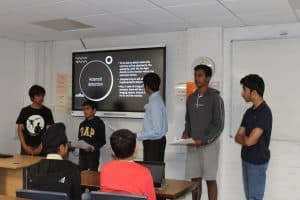 The challenge has two main objectives: to help foster pupils’ interest in Science, Technology, Engineering and Mathematics (STEM), and to help them develop so-called ‘soft skills’, such as team-working, communication, and the ability to solve complex problems.
The challenge has two main objectives: to help foster pupils’ interest in Science, Technology, Engineering and Mathematics (STEM), and to help them develop so-called ‘soft skills’, such as team-working, communication, and the ability to solve complex problems.
Aadil, who studied Physics at Imperial College London and now works as a data analyst for the Civil Service, said: “It was a joy to see the teams rise to the challenge, and to work productively in a way that rivals some professional teams!”
Harikesan, who is working towards a Master’s in Engineering for International Development at UCL, added: “The boys engaged within and outside their teams to produce some truly amazing designs. The fact that all teams won contracts is a testament to the quality of work produced across the board. Everyone really was a winner today!”
Neelesh now works as a technical analyst at Credit Suisse, having read Electrical & Electronic Engineering at Imperial College London. He said: “A brilliant amalgamation of strategy, engineering, science and public speaking skills – the Galactic Challenge was a joy to help with.”
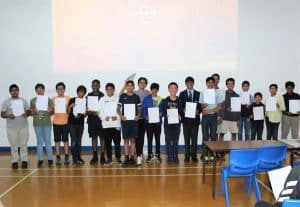 Suchira left QE to read Politics and International Studies at the University of Warwick, before securing a role as a consulting data analyst at the Information Lab. He said: “As a volunteer it was inspiring to see how engaged and active the students were in the competition, the out-of-the-box thinking, novel problem-solving and, in nearly every case, a board-worthy presentation!”
Suchira left QE to read Politics and International Studies at the University of Warwick, before securing a role as a consulting data analyst at the Information Lab. He said: “As a volunteer it was inspiring to see how engaged and active the students were in the competition, the out-of-the-box thinking, novel problem-solving and, in nearly every case, a board-worthy presentation!”
All four OEs commented on how much they had enjoyed being back at the School in person, observing that much had changed there in the past five years.
The three ‘companies’, Astrodyne Delta, Infinity Airspace and Solaris Flight Systems, were given a Request for Proposal (RFP) reflecting a typical design brief in the space engineering industry. They were asked to bid on a range of design modules: from the design of the command centre, to the power & energy generation, and the operations of the resort facility itself.
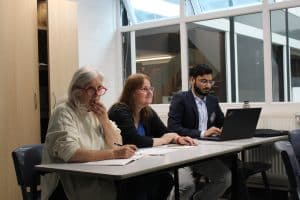 After trailing team Astrodyne Delta through the early stages of the competition, Solaris Flight Systems came through in the final stage to secure victory by the tightest of margins, winning contracts worth £320bn, against Astrodyne Delta’s £315bn. Infinity Airspace were not too far behind, on £300bn, with all three impressing the judges and securing contracts.
After trailing team Astrodyne Delta through the early stages of the competition, Solaris Flight Systems came through in the final stage to secure victory by the tightest of margins, winning contracts worth £320bn, against Astrodyne Delta’s £315bn. Infinity Airspace were not too far behind, on £300bn, with all three impressing the judges and securing contracts.
The judging panel comprised: Jenny Lyons, Director of Education at the Galactic Challenge; Alison Ahearn, Deputy Director of Education at the Galactic Challenge and Principal Teaching Fellow at Imperial College London; Headmaster Neil Enright; Gillian Ridge, Head of Biology; Tamara Rakviashvili, Science Technician, and Science teachers Bryn Evans, and J Murphy.
The designs were assessed in three stages over the day. Stages 1 and 2 were presented during the day to peers and judges, while Stage 3 was presented at the end of the day to parents, peers and the judging panel.
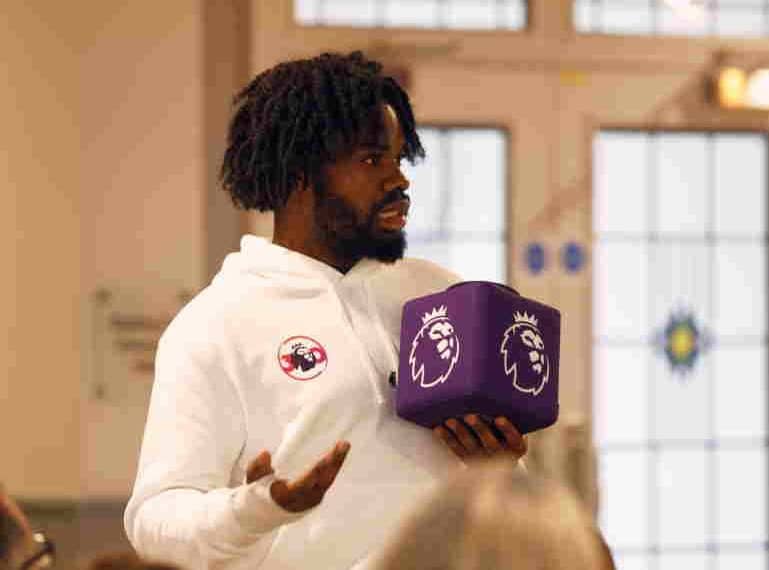

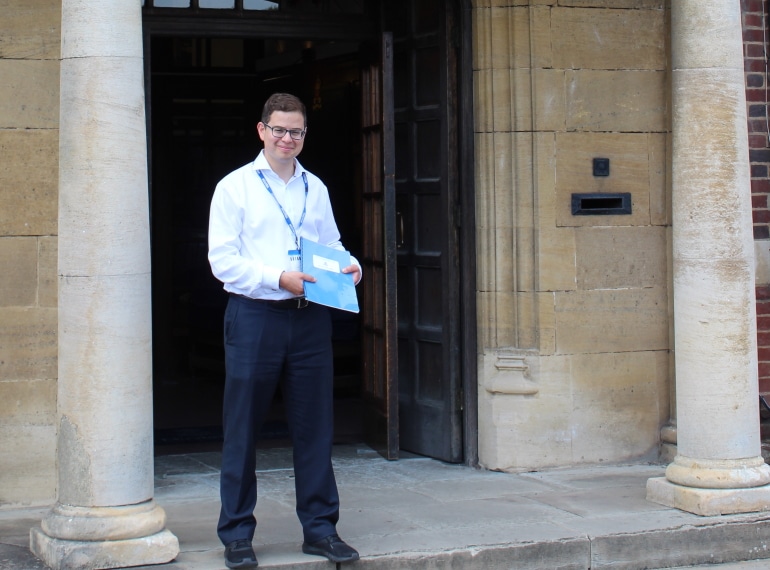
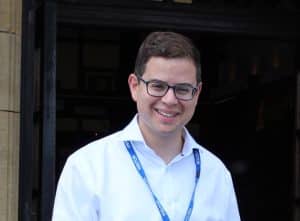 Max (OE 1991–1998), a corporate communications expert, visited the School to speak to a select group of sixth-formers.
Max (OE 1991–1998), a corporate communications expert, visited the School to speak to a select group of sixth-formers.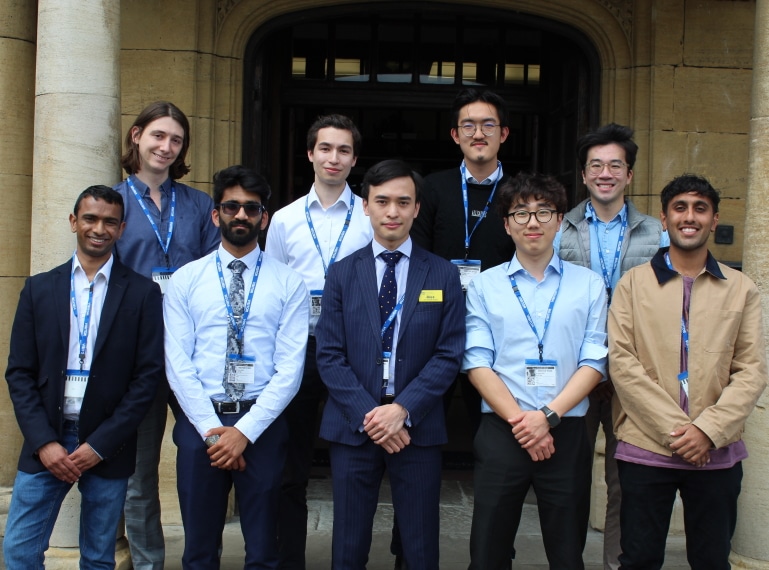
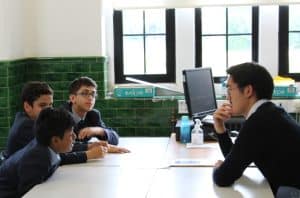 All but one of the group from the Class of 2016 (those who started at QE in 2009) were from Broughton House, and so they duly enjoyed the opportunity to talk to the young Broughtonians of today.
All but one of the group from the Class of 2016 (those who started at QE in 2009) were from Broughton House, and so they duly enjoyed the opportunity to talk to the young Broughtonians of today.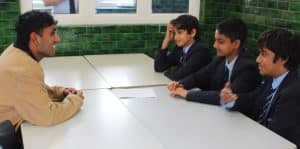 They then did a careers ‘speed-dating’ workshop in which they introduced their roles and industries, and the key skills and routes into it, to small groups of Year 8 boys. The group included doctors, engineers, a lawyer and a representative of the film industry. There was an opportunity for the boys to ask questions of the visitors.
They then did a careers ‘speed-dating’ workshop in which they introduced their roles and industries, and the key skills and routes into it, to small groups of Year 8 boys. The group included doctors, engineers, a lawyer and a representative of the film industry. There was an opportunity for the boys to ask questions of the visitors.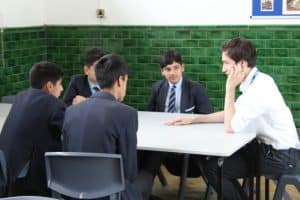 Two engineers: mechanical engineer Lampojan Raveenthiranathan, who studied at UCL and now works for a company which designs and manufactures components for military aircraft ejector seats, and civil engineer Roderick Lee;
Two engineers: mechanical engineer Lampojan Raveenthiranathan, who studied at UCL and now works for a company which designs and manufactures components for military aircraft ejector seats, and civil engineer Roderick Lee;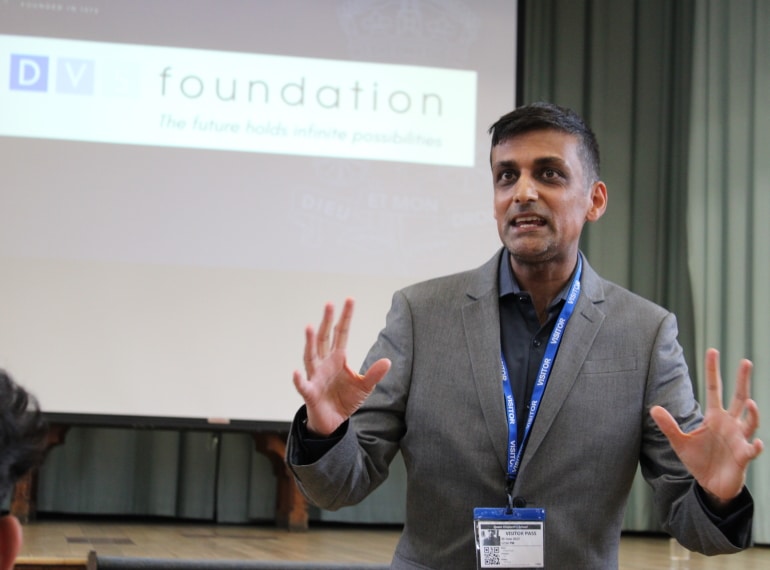
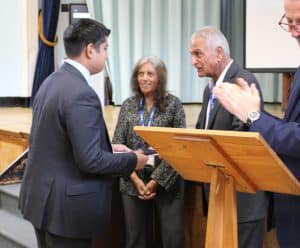 Together with his parents, Dhiru and Rami, Priyan (OE 1991–1998) visited the School to present DVS Foundation Awards to ten sixth-formers.
Together with his parents, Dhiru and Rami, Priyan (OE 1991–1998) visited the School to present DVS Foundation Awards to ten sixth-formers.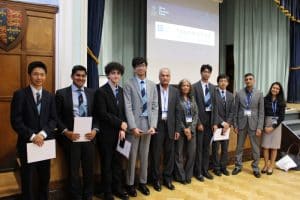 Introducing its work in a special assembly, he explained that the foundation supports other organisations as well as operating its own programmes. These include not only the awards programme, which was launched in 2021, but also its WhyOhYou personal development programme. QE plans to get involved in WhyOhYou during the autumn.
Introducing its work in a special assembly, he explained that the foundation supports other organisations as well as operating its own programmes. These include not only the awards programme, which was launched in 2021, but also its WhyOhYou personal development programme. QE plans to get involved in WhyOhYou during the autumn.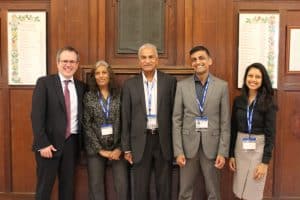 The Headmaster added: “I look forward to working with the foundation through WhyOhYou in the coming months: my thanks go to Rupal Shah for her work coordinating the scheme.”
The Headmaster added: “I look forward to working with the foundation through WhyOhYou in the coming months: my thanks go to Rupal Shah for her work coordinating the scheme.”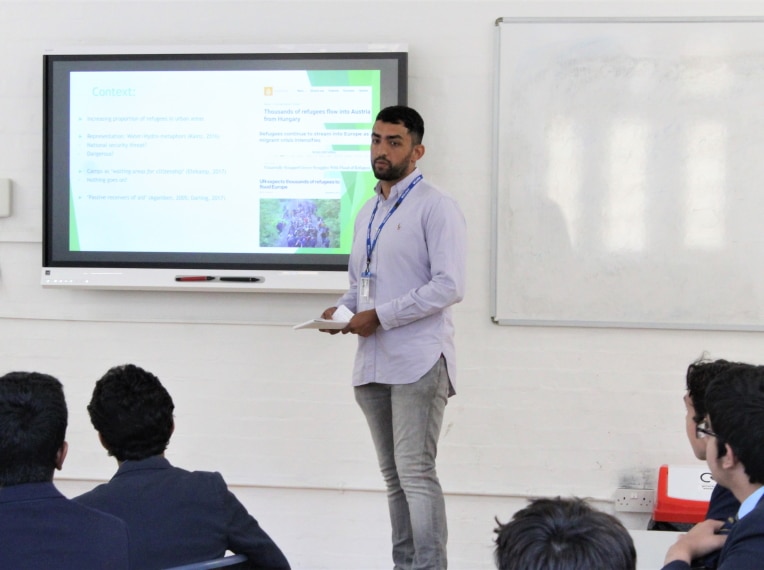
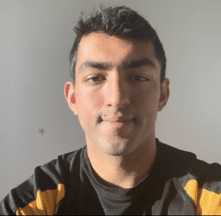 Sajjad (OE 2009–2016), who graduated in Human Geography from Durham University, highlighted how media portrayals often create negative perceptions of refugees, often showing them either as a threat or as merely passive receivers of aid.
Sajjad (OE 2009–2016), who graduated in Human Geography from Durham University, highlighted how media portrayals often create negative perceptions of refugees, often showing them either as a threat or as merely passive receivers of aid.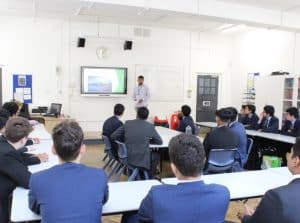 His aim, he said, was to “unveil narratives that are often not shown by the general media”. How refugees are represented is very important, he averred. Sajjad noted that ‘flooding’ metaphors are often used in reference to refugees, implying that they present a problem which is “overwhelming and uncontrollable”.
His aim, he said, was to “unveil narratives that are often not shown by the general media”. How refugees are represented is very important, he averred. Sajjad noted that ‘flooding’ metaphors are often used in reference to refugees, implying that they present a problem which is “overwhelming and uncontrollable”.
 Lending their expertise and experience on the day were four 2017 leavers: Aadil Kara, Neelesh Ravichandran and Harikesan Baskaran and Suchira Peiris. Aadil, Neelesh and Harikesan all got through to the national stages of the UK Space Design Competition (Galactic Challenge’s ‘big brother’ for older pupils) when they were in Year 13, with Aadil going on to reach international level.
Lending their expertise and experience on the day were four 2017 leavers: Aadil Kara, Neelesh Ravichandran and Harikesan Baskaran and Suchira Peiris. Aadil, Neelesh and Harikesan all got through to the national stages of the UK Space Design Competition (Galactic Challenge’s ‘big brother’ for older pupils) when they were in Year 13, with Aadil going on to reach international level. The challenge has two main objectives: to help foster pupils’ interest in Science, Technology, Engineering and Mathematics (STEM), and to help them develop so-called ‘soft skills’, such as team-working, communication, and the ability to solve complex problems.
The challenge has two main objectives: to help foster pupils’ interest in Science, Technology, Engineering and Mathematics (STEM), and to help them develop so-called ‘soft skills’, such as team-working, communication, and the ability to solve complex problems. Suchira left QE to read Politics and International Studies at the University of Warwick, before securing a role as a consulting data analyst at the Information Lab. He said: “As a volunteer it was inspiring to see how engaged and active the students were in the competition, the out-of-the-box thinking, novel problem-solving and, in nearly every case, a board-worthy presentation!”
Suchira left QE to read Politics and International Studies at the University of Warwick, before securing a role as a consulting data analyst at the Information Lab. He said: “As a volunteer it was inspiring to see how engaged and active the students were in the competition, the out-of-the-box thinking, novel problem-solving and, in nearly every case, a board-worthy presentation!” After trailing team Astrodyne Delta through the early stages of the competition, Solaris Flight Systems came through in the final stage to secure victory by the tightest of margins, winning contracts worth £320bn, against Astrodyne Delta’s £315bn. Infinity Airspace were not too far behind, on £300bn, with all three impressing the judges and securing contracts.
After trailing team Astrodyne Delta through the early stages of the competition, Solaris Flight Systems came through in the final stage to secure victory by the tightest of margins, winning contracts worth £320bn, against Astrodyne Delta’s £315bn. Infinity Airspace were not too far behind, on £300bn, with all three impressing the judges and securing contracts.